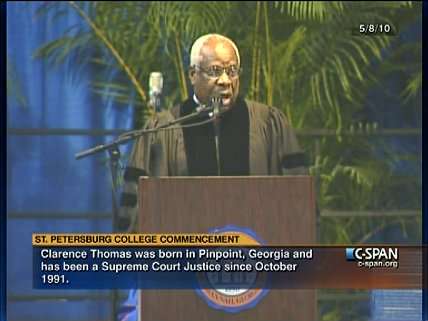Clarence Thomas Continues His Long War on Affirmative Action

In his memoir My Grandfather's Son, Supreme Court Justice Clarence Thomas pointed to his years at Yale Law School as the genesis of his hostility to affirmative action. "Before long I realized that those blacks who benefitted from it were being judged by a double standard," Thomas wrote. "As much as it stung to be told that I'd done well in the seminary despite my race, it was far worse to feel that I was now at Yale because of it." In response, he took extra course credits and pursued a tough field of study. But in the end, Thomas recalled, he found "the stigmatizing effects of racial preference" impossible to escape and "began to fear that it would be used forever after to discount my achievements."
The passage of time has done little to diminish that negative understanding. A decade ago, when the Supreme Court narrowly upheld the University of Michigan's use of race in law school admissions, Thomas filed a lengthy dissent, arguing that such racial preferences do an injustice to their purported beneficiaries. "When blacks take positions in the highest places of government, industry, or academia, it is an open question today whether their skin color played a part in their advancement," he argued. "The question itself is the stigma–because either racial discrimination did play a role, in which case the person may be deemed 'otherwise unqualified,' or it did not, in which case asking the question itself unfairly marks those blacks who would succeed without discrimination."
Earlier today, the Supreme Court returned once more to the divisive issue of affirmative action in higher education, and once more, Clarence Thomas left no doubt about where he stood. Although he joined Justice Anthony Kennedy's anticlimactic majority opinion in Fisher v. University of Texas at Austin, which did not rule on the constitutionality of the school's admissions policy but instead sent the dispute back to the federal appellate court for further proceedings, Thomas wrote separately to restate his longstanding case for abolishing racial preferences in public education once and for all.
"Although cloaked in good intentions, the University's racial tinkering harms the very people it claims to be helping," Thomas wrote. Returning to themes he has advanced throughout his career, Thomas argued in favor of a colorblind reading of the 14th Amendment. "The Equal Protection Clause strips States of all authority to use race as a factor in providing education," he declared. "All applicants must be treated equally under the law, and no benefit in the eye of the beholder can justify racial discrimination."
With the present case remanded back to the lower court and future challenges brewing on other university campuses, it's likely this won't be the last time we hear from Thomas on this particular question. But for now, his views remain those of a dissenter, unable to command a majority on the Supreme Court.


Show Comments (93)